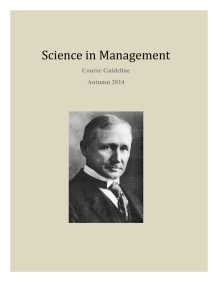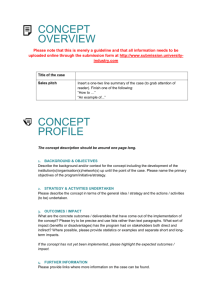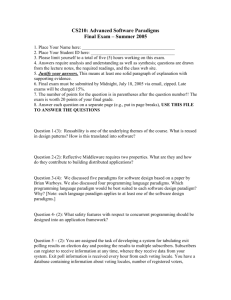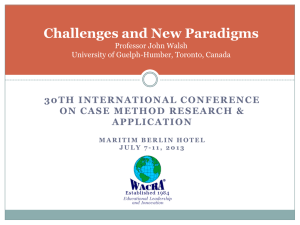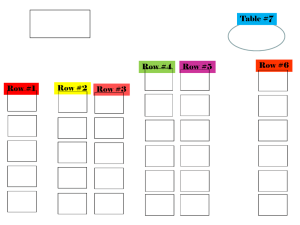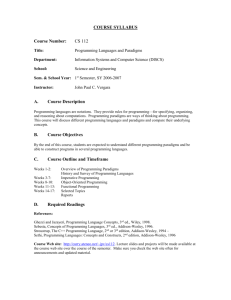Table of Contents
advertisement
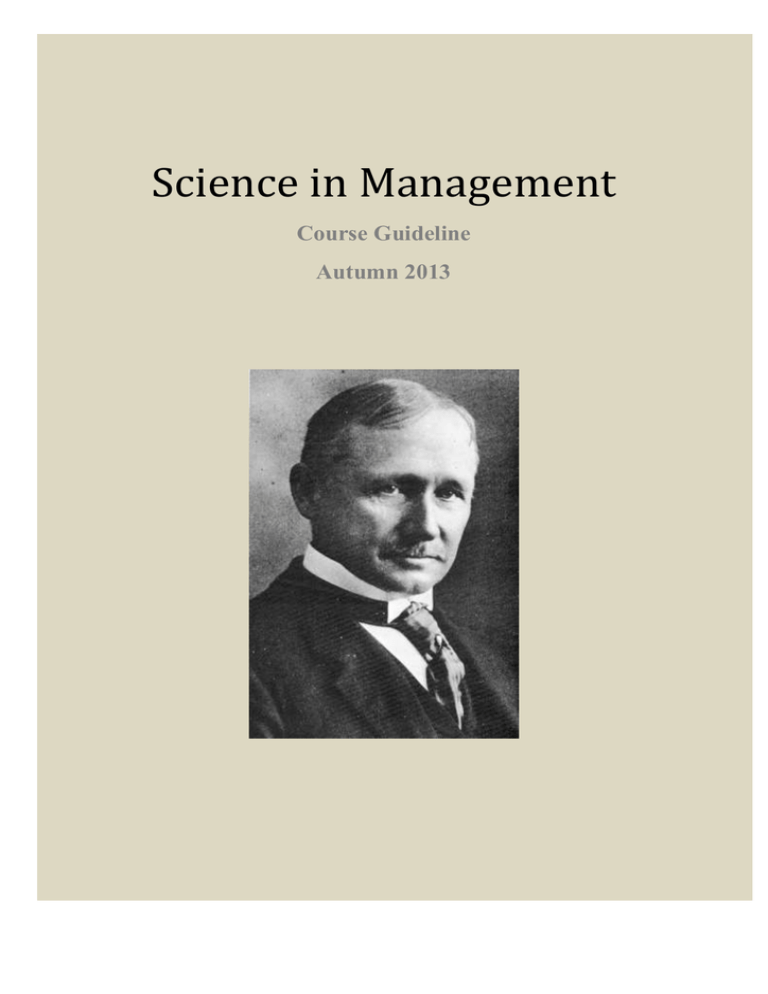
1 TYPE THE DOCUMENT TITLE STRATEGY AND ORGANIZATION: GUIDELINES FOR GROUP REPORTTYPE 1 THE DOCUMENT TITLE Science in Management Course Guideline Autumn 2013 Course Guideline: Science in Management Table of Contents 1. INTRODUCTION ............................................................................................................................ 3 LEARNING OUTCOMES ..................................................................................................................................... 3 STRUCTURE OF THE COURSE AND SCHEDULE .............................................................................................. 3 2. ASSESSMENT ................................................................................................................................... 5 EXAM .................................................................................................................................................................. 5 ASSIGNMENT 1: THESIS PRESENTATION ...................................................................................................... 6 ASSIGNMENT 2: ARTICLE REVIEWS .............................................................................................................. 6 ASSIGNMENT 3: SHIFTING PARADIGMS ........................................................................................................ 7 ASSIGNMENT 4: LITERATURE REVIEW ......................................................................................................... 7 SUBMISSION CHECKLIST ............................................................................................................................... 10 GRADING ASSIGNMENTS:.............................................................................................................................. 10 ola.bergstrom@handels.gu.se 2 1. Introduction Management is a field of knowledge with a long history including a wide range of perspectives. This advanced course provides a starting point for the Masters of Science in Management. The purpose of the course is to provide an understanding of the historical development of research in the field of management and its scientific and philosophical underpinnings. This includes ontological, epistemological and methodological problems. After completing the course students will be able to understand the different scientific and philosophical assumptions in the field of management as well as analyse, identify and account for the broad range of methodological and scientific perspectives in management research. Learning outcomes After completion of the course you are expected to be able to: 1. Understand how different scientific approaches lead to differences in focus as well as results in the historical development of management research 2. Apply this understanding to the field of management, both historical and current research 3. Critically and constructively analyze previous and present research in the field of management • Learning outcome 1 will be examined through a written exam and written reports. • Learning outcome 2 will be examined through written reports and oral presentations • Learning outcome 3 will be examined through oral presentations in front of an audience. Structure of the course and schedule The course is divided in three modules. The first module – Management Classics provides an overview of key contributions in management thinking in the early 20th century. The second module – Scientific paradigms – provides a deeper analysis of the philosophical underpinnings of various scientific paradigms in management research. In the third and final module some of the recent developments of management research is discussed and elaborated upon. The main idea of this module is to provide a general understanding of the theoretical perspectives discussed more thoroughly in later courses in this programme. 3 Course Guideline: Science in Management The course consists of twelve lectures and six seminars. Lecturers are asked to discuss and illustrate some of the key ideas in the field of management research. The key idea is that you should get a good overview of the historical background and recent developments in the field of Management as a starting point for your own research. Please note, you are expected to read the articles before the lecture. Reading the articles before the lecture not only enhances your learning, it also gives you a great opportunity to participate and ask critical questions. All lectures and seminars are on Mondays and Tuesdays. They are all located in the School of Business, Economics and Law. For location see schedule on the course portal. Active participation in seminars is compulsory. The discussions will be organised in a way that guarantees every participant a possibility to contribute. Lectures Teacher Literature Part 1: Management classics L1 Course introduction AS L2 Scientific management GKK S1 Assignment 1 AS S2 Assignment 1 AS L3 Systems rationalism ÖO Burns & Stalker, Lawrence & Lorsch L4 Human relations UEZ Acker & Van Houten, Merret L5 Decision making AS Cohen et al, March L6 Scientific paradigms VO Burrell & Morgan S3 Literature seminar VO S4 Literature seminar VO Rosen, Gibson, Watson, et.al., West & Zimmerman Rosen, Gibson, Watson, et.al., West & Zimmerman Taylor, Fayol Part 2: Scientific paradigms Part 3: Theoretical developments L7 Actor-network theory FL Latour, Akrich L8 Institutional theory MN Meyer &Rowan, DiMaggio& Powell L9 Gender UEZ L10 Organizational learning AD West & Zimmerman, Acker & Va n Houten Levitt & March, Spender L11 Organizational culture GK Rosen, Barley & Kunda L12 Summing up AS S5 Assignment 4 AS S6 Assignment 4 AS ola.bergstrom@handels.gu.se 4 Lecturers AD: Andreas Diedrich AS: Alexander Styhre GKK: Gary Kokk FL: Fredrik Lavén GK: Gideon Kunda MN: Maria Norbäck VO: Vedran Omanovic UEZ: Ulla Erikssom-Zetterquist ÖO: Östen Ohlsson 2. Assessment The course will be assessed through four individual assignments and one individual exam. To obtain a pass in the course, the student must have at least a pass in all individual tests (The exam and the four assignments). To obtain a Pass with Distinction students need to have a pass with distinction on the exam and assignment 3 and 4. Exam Assignment 1 Assignment 2 Assignment 3 Assignment 4 Points Form Learning outcome 50 Pass Pass Pass Pass 1, 2 and 3 2, 3 1, 2, 3 1, 2, 3 1, 2, 3 Written exam Written paper and oral presentation Written papers Written paper Written paper and oral presentation In the following sections you will find more detailed instructions for the three forms of assessment in the course. Exam The purpose of the exam is to assess your knowledge and understanding of how different scientific approaches lead to differences in focus as well as results in the historical development of management research. The basis for the exam is the lectures and the articles provided in the reading list above. The exam is an individual exercise and will take place on October 31, 8.00-12.00, Viktoriagatan 30. The exam consists of six questions, each giving a maximum of 10 points and in total a maximum of 60 points. Pass: 30 points, Pass with distinction: 45 points. Please consider the following when you write the exam: - Plan your answers carefully. Don’t just start writing. Start by making clear in each answer how you have understood the question, how you will answer it and what your focus is. - Try to reflect upon each question in your answer, and use theoretical models and concepts from the literature to explain and argue for your point. Aim for a balance between writing both about the theory and practical realities. - You are expected to use the course literature (without explaining and offering summaries of theories, models and perspectives). You may also use references 5 Course Guideline: Science in Management - - - - to other articles or other sources of information. You may also refer to your own practical experiences (but you do NOT have to), during or outside of the course, if you find this to be relevant to support your arguments. Argue as clearly as you can for all your statements, showing your thinking and assumptions explicitly. Avoid generalizing statements. Showing nuances (complexity or multiple perspectives) is seen as a sign of critical thinking and is highly appreciated. Please try to structure your answers so that we can understand your text easily. Focus on the most important and present it logically. Doing so, there is no need for more than one page per question. Remember that we are not examining your English, but try your best to make it understandable. We will try our best to understand what you mean. Dictionaries may be used. The exam results will be published on GUL four weeks after the exam. Assignment 1: Thesis presentation Write down a 200 words description of the research that you have done at the bachelors level, according to the following structure: – – – – – – Title The research question and purpose Your theoretical approach What methodology was adopted for the collection of data? How was the data analyzed? What were the key findings? • Deadline: Submit your paper by the 6th of September, at 13.00, preferably as a hard-copy in the brown mailbox outside of Alexander Styhre’s office on floor 5, the J-building, or, by e-mail to alexander.styhre@handels.gu.se. • Oral presentation: Papers will be presented orally on the first two seminars on the 9th and 10th of September. • Prepare a 5 minutes presentation (no more, no less). Power points may be used. Assignment 2: Article reviews Before each lecture: Submit a short summary of the scheduled readings for each lecture. List two or three questions related to your research or area of interest. • Maximum 150-200 words per article. ola.bergstrom@handels.gu.se 6 • Print out and give to lecturer a hard-copy of the paper before the lecture. No e-mail, please! • Do not forget to label with your name and title of articles. • Deadline: Before each lecture. Assignment 3: Shifting paradigms Write a short paper where you position your own research as presented in Assignment 1 in relation to the four scientific paradigms suggested by Burrell & Morgan. Please consider the following three questions: (1) What ontology have you adopted? (i.e. How far do you consider the thing you have investigated real/objective, or social/subjective), and (2) What epistemology have you adopted (positivist, relativist, or social constructionist)? (3) What assumptions have you adopted in terms of harmony or conflict? Write down a 200 word description of how your research would change if you change paradigm, including – The research question and purpose – Your theoretical approach – How you would conduct the study (methodology) – How data would be analyzed – Possible results • Deadline: Submit your paper electronically (e-mail: alexander.styhre@handels.gu.se) to the course leader on October 1st.. Assignment 4: Literature review The purpose of assignment 4 is to develop your ability to critically and constructively analyze previous and present research in the field of management. Reviewing previous research is one of the corner stones of scientific work. Literature reviews can be related to a particular topic, for example business ethics, studies of knowledge management or cross-cultural management, or they can be related to a particular theory or concept. Each of you will write a literature review according to the structure suggested below. Your literature review will be presented in a written report and an oral presentation in the end of the course. These guidelines should answer many of your questions about how to write and submit your literature review. 7 Course Guideline: Science in Management Procedure 1. The report should be written individually. It is possible that you coordinate your project with other students’, but your literature review should be written individually. 2. The following steps are recommended: - - - - • Read guidelines carefully. Select two journal articles that you find interesting and relevant. You may identify articles based on previous literature in the course, theoretical ideas/problems or relevant topics in organizations. Your selected articles must meet the following criteria: o The selection should be made from the list of journals below. o The first should have been published within the last five years and the second should have been published before 1995. o Both articles should be empirical. Review articles are not accepted. o The first article should have been cited at least 1000 times. o Both articles should address the same theme, but they should be representatives of different scientific paradigms. To find good articles you may use google scholar or the university library databases. One possibility is to search for an old article, which is often cited, and search for a later article that cites the old. You may also start with a new article, which is using an older article as a key reference. Start writing your literature review as soon as possible. Deadline: Oral presentation of your final report will be made on the 28th and 29th of October. Prepare your presentation carefully. The quality of your presentation will affect the grading of your report. Do not hesitate to ask your lecturers about interesting articles. List of Journals – Administrative Science Quarterly – Organization Studies – Organization Science – Academy of Management Journal – Human Relations – Organization – Gender, Work and Organization – Journal of Management Studies ola.bergstrom@handels.gu.se 8 2. Structure of the report. Your task is to identify the following themes in each article and compare them: – – – Introduction • Introduce the topic. Why is it relevant? • Why did you choose the two articles? • How many times have the articles been cited? Comparative analysis • What theoretical approach and philosophical position underpins each article? • What method was adopted for the collection of data? • What were the nature and the size of the sample? • How were the data analyzed? • What were the key findings? Concluding remarks • • What did you learn from the two articles regarding: • The development knowledge in the field • The scientific development Other reflections 3. Length of the review. The text of each review should not exceed 1,000 words. Large graphs, tables and images can be placed in an appendix. 4. Use of previously published material. Your report should include references to scientific articles, books, and reports. Relevant references may be found in the electronic databases in the library. Google Scholar is the easiest way to find academic articles, but please make sure that you are logged in through the university. 5. Submit your literature review electronically to the course leader. Deadlines: I. Choice of articles: October 1st II. Submission: October 25th, 10.00, as hard-copy to AS 9 Course Guideline: Science in Management III. Oral presentation: October 28 and 29 Submission checklist All reports should be formatted with justified alignment, 1” margins all around, in Times Roman 12, line spacing at 1.5. Your reports should be in Word (for Windows). Please proof-read your reports. Illustrations, such as tables, figures, and graphs should be presented in appendixes with full information of sources. Illustrations will not be regarded as included in the number of pages required. Always keep electronic and hardcopy copies of your reports. Also keep copies of your source material in case questions arise during the examination process. Grading assignments: Assignment 1 Assignment 2 Assignment 3 Assignment 4 Fail Pass No presentation, key elements missing. Submission not on time. Name and titles missing Submission not on time Well structured presentation, within time limit Relevant questions and summary. All articles covered. Submission not on time Limited scope of review. Grave misunderstanding of key elements. Well-structured presentation, within time limit. Written paper, including references following the Harvard Citation System. All relevant aspects covered. All elements covered. Discussion including references following the Harvard Citation System. ola.bergstrom@handels.gu.se Pass with distinction Elaborated insightful and well-motivated discussion in relation to the Burrell and Morgan model. Elaborated, well motivated and structured discussions and conclusions comparing the two articles in relation to the Burrell and Morgan model. 10
